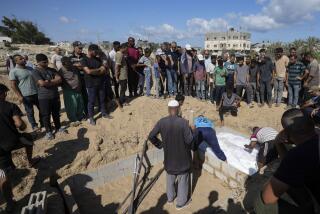Hope dims for finding survivors of deadly Guatemala mudslide
- Share via
SANTA CATARINA PINULA, Guatemala — Hope faded Sunday for finding any survivors of a mudslide that killed at least 131 people as the smell of rotting bodies spread across the enormous mound of earth and rescuers reported the buried dwellings they reached were filled with water, suggesting anyone trapped inside would have drowned.
Rescue workers on Sunday pulled more corpses from the mound created when a hillside collapsed and covered about 4 acres (1.7 hectares) with mud and dirt as deep as 15 yards (meters).
Julio Sanchez, spokesman for Guatemala’s volunteer firefighters, said 131 bodies had been pulled from the mud.
At an improvised morgue, 82 bodies have been identified and handed over to relatives, said municipal medical examiner Dr. Carlos Augusto Rodas Gonzalez. However, other bodies, some of which were found in pieces, remain unidentified.
The grim list of the dead who have been identified included at least 26 children and teenagers.
Rescuers decided to keep individual emergency workers, relatives and reporters off the increasingly foul-smelling mound of dirt. Instead of digging by hand and listening for survivors, crews planned to use mostly backhoes and bulldozers to speed up the search for bodies.
“The people who could have been alive have drowned,” said services coordinator Sergio Cabanas, explaining that rescue personnel on foot would be sent out mainly when a backhoe turns up a corpse. “Ninety percent of it we will do with heavy machinery.”
Authorities said about 300 people may still be missing. But they left open the possibility that many of them had simply fled and taken refuge with relatives without contacting authorities, or that they were not in the 125 buried homes when the mudslide struck.
It was discouraging news for those who still held out hope of finding relatives buried by Thursday night’s disaster, which inundated much of the Cambray neighborhood in Santa Catarina Pinula, a middle-class community of government workers, salesmen, taxi drivers and cooks.
As time went on, hope of finding anyone alive dwindled.
“Only a miracle can save them,” rescue worker Ines de Leon said.
But family members who had already identified their dead at the improvised morgue resigned themselves to the grim task of burying them in the crowded local cemetery.
City workers rapidly prepared burial niches in a large crypt wall for the dead, with dozens of square holes awaiting coffins. At least 16 coffins had been interred by Sunday, and the names of the deceased were etched into the fresh cement used to seal the crypts.
But lines of families with coffins, some holding the remains of children, crowded the narrow pathways that lead through the graveyard to the wall of crypts.
The coffin of high school student Bryan Sandoval, 17, was escorted to his grave by his school’s marching band, in which he was a drummer. The drum major was crying while raising his baton and leading the band.
In all, at least six members of Sandoval’s extended family were buried in a long procession of caskets.
Miriam Cifuentes was at the Santa Catarina Pinula cemetery to bury her older son, Jonathan. She was upstairs in her house in Cambray with her husband and Alex and was just about to go to bed on Thursday night when the mudslide hit. Her older son Jonathan, 16, was downstairs taking out the garbage.
Suddenly she heard a noise like a rushing river, then like a stream of cars coming at full speed. She opened the window to see what was going on and saw a dust cloud coming toward them.
“We’re going to die,” she thought, as they started to slide and tumble as concrete blocks rained on top of them.
Cifuentes punched her way through the rubble and ran for help. Her brother and father came and dug out her son Alex. Firefighters dug out husband, Felix Torres.
Both Alex and Jonathan were born in San Jose, California. The family returned to Guatemala 10 years ago to resolve their immigration status with the hope of returning.
On Sunday, covered with bruises and scrapes, the family buried Jonathan, the only one they could not rescue. Alex was inconsolable at the thought of burying his big brother.
“He was a noble person. Everyone loved him,” Cifuentes said of Jonathan.
The family ran a store, which was also destroyed.
“We lost everything, our house, our business, our work,” Cifuentes said.
All afternoon, family after family walked the same narrow grass passageway between the mausoleums to bury the dead, some singing and praying, many crying, many repeating the same phrase in the face of such an overwhelming tragedy: “There are no words.”
Copyright 2015 The Associated Press. All rights reserved. This material may not be published, broadcast, rewritten or redistributed.
More to Read
Sign up for Essential California
The most important California stories and recommendations in your inbox every morning.
You may occasionally receive promotional content from the Los Angeles Times.










